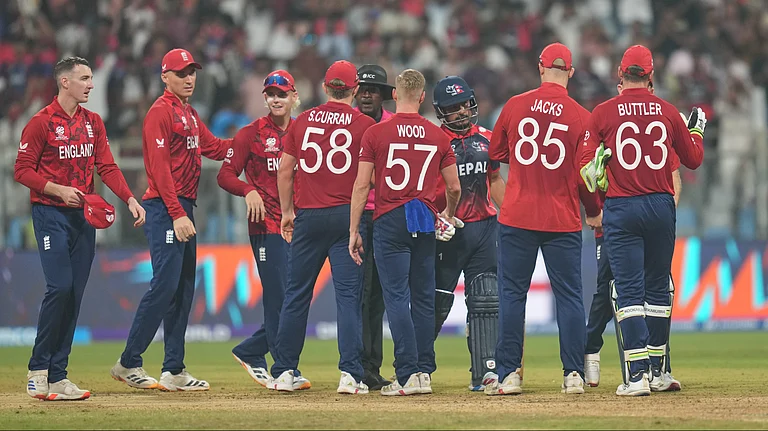Nothing, it seems, is going right for Atal Behari Vajpayee. The mist of self-doubt enveloping the nation since the hijacking of IC 814, intensified as it is by the media, contributes to a pervasive sense of inadequacy and insecurity. This situation is only being exploited and further exaggerated by hardline saffron elements in the BJP and the Sangh parivar. Their objective is to coerce the prime minister into accepting the diktat of the RSS.
In Gujarat, the state government has opened a window for RSS infiltration into the public services by lifting the ban on government servants joining it. Criticism of the Vajpayee government for mishandling the hijacking has been seized upon to put pressure on the Centre. Rajendra Singh, the RSS chief, used the episode to revive the thesis of "Hindu cowardice" that some pre-Independence historians promoted to arouse militancy against Muslims. The revival goes beyond contrasting the hostages religion with that of the hijackers. It serves to reawaken historic memories of Muslim domination and suggests that the only remedy for cowardice is the RSS formula for national regeneration.
VPH working president Ashok Singhal takes the thesis to the point of accusing Captain Saran, pilot of IC 814, of lacking courage-this, for skillfully and with great composure, doing what every pilot is instructed to do: follow the orders of armed hijackers rather than risk the lives of passengers. The soft state thesis is being distorted and exploited by the Sangh parivar to reinforce their campaign for a harsh, authoritarian, saffron state. An article in the Sangh journal Organiser is revealing. "The curse of Indian public life," it states, "is the worship of personalities uncritically. Nowhere is this more apparent than in the mindless invocation of Mahatma Gandhi as the Father of the Nation while ignoring the fact that he was also the Father of Appeasement, which led the country to two disasters-the Moplah rebellion and Partition. Its the same legacy that haunts India in the form of the soft state, against which Pakistan, and anyone who pleases, can launch attacks with impunity."
Yet if the writer, or others who have freely misused Gunnar Myrdals phrase soft state had read his seminal work, Asian Drama, they wouldve found that it had nothing to do with resistance to foreign attack or alleged Hindu cowardice. The weakness he draws attention to lies in "the inability or unwillingness to reform the social and economic structure of the country," for which he blames the continuing control of reactionary elements of society on the levers of power. He goes on to state that "the main obstacle to Indias consolidation as a nation is the wide social and economic cleavages among its people and the accompanying inequalities of welfare and opportunity." Myrdal describes Indias political pattern as of "bold radicalism in principle and extreme conservatism in practice." Consequently, "the dichotomy between ideals and reality, and even between enacted legislation and implementation, should be seen against the background that India, like other South Asian countries, is a soft state." By his definition, Pakistans more of a soft state, as it lags behind India in social reform.
None of these concerns is reflected in the saffron campaign, which thrives on notions of national (read Hindu) weakness and insecurity. In portraying India as a perpetual victim of aggression, saffron spokesmen conveniently forget the dismemberment of Pakistan with the help of Indian arms in 71. And to talk of Hindu cowardice after the exemplary courage shown recently in retaking the Kargil heights is a slap in the face of the armed forces, manned mainly by Hindus.
The media, often unwittingly, helped promote the saffron campaign with its coverage of the hijacking. It projected, even played up the emotional demands of the relatives for accepting the hijackers terms in a manner that could only weaken the governments resolve and strengthen the hijackers hands. Then, when an exchange was negotiated after eight suspenseful days, the government was roundly condemned for capitulating. Star and Zee TV seemed to compete in interviewing individuals who endorsed the relatives pleas with the anchor persons setting the tone. Other experts, with no idea of the problems involved, pressed for a commando raid to free the hostages. Soon after, the Taliban put IC 814 under a heavy guard. A rumour that the hostages had been freed was telecast, only to be found false. Its hard to conceive of a more irresponsible use of live media with lives of 262 passengers and crew hanging in the balance.
The print media did not lag far behind. "They (the government) should be hanged by the nearest lamp post. Dont they have families?" and "Shoot us! They are killing our relatives in the plane. You kill us here", screamed headlines in the Indian Express. The precedent of five terrorists being exchanged for Mufti Mohammed Sayeeds daughter in 89 was repeatedly recalled. The picture drawn was of a callous government playing with innocent lives to project a tough image. But after the deal was struck, the media, this time mostly print, went to the other extreme. We were told that releasing the militants had humiliated the nation and disgraced it in the world. Justified indignation over the serious flaws in crisis management was extended to the terms of the exchange. However, no foreign government, or media, has interpreted the exchange as evidence of national weakness. Whats been viewed with concern are the flaws in crisis management in a nuclear state.
Were yet to see whether the saffron campaign succeeds in altering the moderate stance of the Vajpayee government. But some reactions to the charge of weakness are indicative. One is the increasingly shrill tone of warnings to Pakistan. Another is a return to harsh cordon-and-search operations in J&K. If local Muslims are further antagonised, two-nation theorists on both sides of the border will be happy.


























